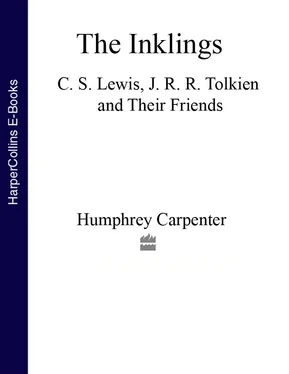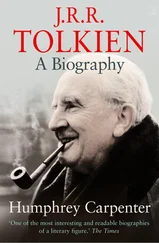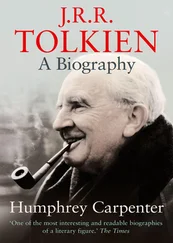*
Lewis’s long narrative poem Dymer was now finished. It was offered to Heinemann, who had published his 1918 volume of verse, and Lewis was badly shaken when they rejected it. He asked Nevill Coghill for an opinion of the poem. Coghill was quite enthusiastic, liking Dymer enough to pass it to a friend who worked for J. M. Dent; and he and Lewis were delighted when Dent’s expressed admiration and agreed to publish it. When it was issued in 1926 it earned some good reviews. But almost nobody bought it, and Lewis now doubted whether he would achieve success as a poet. He still believed that poetry was his ‘only real line’, but though he went on writing verse it took up a smaller part of his attention. Another factor in this was that old friends from undergraduate days, such as Owen Barfield, were no longer at hand to give advice and criticism. Indeed there were many ways in which Lewis felt the need for more companionship. In a letter to another friend from undergraduate days who had now left the University, A. K. Hamilton Jenkin, Lewis described the idyllic setting of his college rooms and went on: ‘I wish there was anyone here childish enough (or permanent enough, not the slave of his particular and outward age) to share it with me. Is it that no man makes real friends after he has passed the undergraduate age? Because I get no forr’arder, since the old days. I go to Barfield for sheer wisdom and a sort of richness of spirit. I go to you for some smaller and yet more intimate connexion with the feel of Things. But the question I am asking is why I meet no such men now. Is it that I am blind? Some of the older men are delightful: the younger fellows are none of them men of understanding. Oh for the people who speak one’s own language.’
*
Professors and college tutors at Oxford do not necessarily meet often in the course of duty, even if they are members of the same faculty. It was not until Tuesday 11 May 1926, after he had been in residence at Magdalen for two terms, that Lewis had a chance to talk at any length to the new Professor of Anglo-Saxon, who had started work in the University at the same time as himself. On that day he went to an ‘English Tea’ at Merton College for a discussion of faculty business.
At the tea there was some discussion of the General Strike, but not much was said about it, for Oxford had scarcely been affected. Then came some business involving the lecture lists. After that (Lewis recorded in his diary) ‘Tolkien managed to get the discussion round to the proposed English Prelim. I had a talk with him afterwards. He is a smooth, pale, fluent little chap – can’t read Spenser because of the forms – thinks the language is the real thing in the school – thinks all literature is written for the amusement of men between thirty and forty – we ought to vote ourselves out of existence if we were honest – still the sound changes and the gobbets are great fun for the dons. His pet abomination is the idea of “liberal studies”. Technical hobbies are more in his line. No harm in him: only needs a smack or so.’
John Ronald Reuel Tolkien was aged thirty-four, young by the standard of Oxford professors. He had been an Oxford undergraduate between 1911 and 1915, reading Classical Moderations and then English, specialising in the ‘language’ side of the course; that is, Anglo-Saxon, Middle English, and philology. After marrying, serving in France during the war, and working briefly in Oxford on the New English Dictionary, he had been appointed Reader in English Language at Leeds University. While teaching in Leeds he had built up a ‘language’ side to the English syllabus that was notable for its imagination and liveliness. Now that he was back in Oxford, he was determined to remodel the Oxford English School’s ‘language’ side on the lines that had been successful in Leeds.
He put his proposals to the Faculty not long after Lewis’s first conversation with him. Lewis was among those who voted against him.
*
In declaring to Lewis that ‘the language is the real thing in the school’, Tolkien was in fact reviving an old Oxford quarrel, which had split the Honour School of English Language and Literature ever since its foundation at the end of the nineteenth century.
It was a quarrel about what a university course in ‘English’ should consist of. One faction believed that it ought to be based on ancient and medieval texts and their language, with at most only a brief excursion into ‘modern’ literature – by ‘modern’ they meant anything later than Chaucer. These people wanted an English course that was as severe a discipline as a study of the classics. On the other side were those who thought the most important thing was to study the whole range of English literature up to the present day.
The two factions had different ancestors. The people who were in favour of ancient and medieval studies and philology (all known familiarly as ‘language’, though a good deal more than linguistics was involved) were the cultural descendants of the traditional Oxford classical scholarship, and more recently of nineteenth-century comparative philologists such as Max Müller. The ‘literature’ people (those in favour of the study of post-Chaucerian writers) were in general a new breed of teachers and literary critics who believed that the study of recent vernacular literature was just as important as reading Latin and Greek or other ancient writings. Indeed many of these people thought that, in a time of broadening educational opportunities, recent literature had a far greater future than ‘dead’ languages as an academic discipline. Some of them (more notably at Cambridge than at Oxford) were also beginning to form the idea that by reading English literature a student could in some way improve his character as well as his knowledge. It was this view which Tolkien attacked so vehemently when he told Lewis that he abominated ‘liberal studies’.
There were several reasons why Tolkien took this attitude. First, he himself had never studied post-Chaucerian literature more than cursorily, for ‘English’ had scarcely been taught at his school (King Edward’s, Birmingham), and as an undergraduate he had concentrated on the ‘language’ side of the English course. Moreover, although he had many favourites among later writers, he took an impish delight in challenging established values, saying that he found The Faerie Queene unreadable because of Spenser’s idiosyncratic treatment of the language, and declaring that Shakespeare had been unjustifiably deified. But a deeper and more important reason was that his own mind and imagination had been captivated since schooldays by early English poems such as Beowulf, Sir Gawain and the Green Knight, and Pearl, and by the Old Icelandic Völsungasaga and Elder Edda. These were all the literature that he needed.
Lewis’s view was rather different. For him the great works of post-Chaucerian literature had, after all, been a source of joy since boyhood. Spenser was a particular favourite with him. He knew comparatively little Anglo-Saxon literature, and though he was deeply attached to Norse mythology he did not know more than a few words of Old Icelandic itself. So the notion that the earliest part of the course was of special importance – or, as Tolkien put it, that ‘the language is the real thing’ – seemed an exaggeration. There was thus every reason for him to vote against Tolkien.
On the other hand the changes proposed by Tolkien were quite logical. At that time the Oxford syllabus was, in his view, gravely deficient in that it did not encourage a literary approach to early and medieval writings; and Tolkien did believe passionately that Anglo-Saxon and Middle-English prose and poetry should be treated as literature and not merely as a quarry for ‘gobbets’ (passages set in examinations) and for teaching the rules of sound-changes. He was annoyed that students were required by the syllabus to learn off pat such linguistic rules as Grimm’s and Verner’s Laws, but did not have to read any Old or Middle-English literature other than short pieces in anthologies. He thought it absurd, in other words, that Lewis’s pupils were having to learn rules by rote (‘Thus Æ to E they soon were fetchin’’) while they scarcely knew any of the literature to which these rules applied. Lewis in fact had realised the absurdity of this situation. Hence his ‘Beer and Beowulf’ evenings, in which his pupils actually did some reading beyond the syllabus.
Читать дальше












